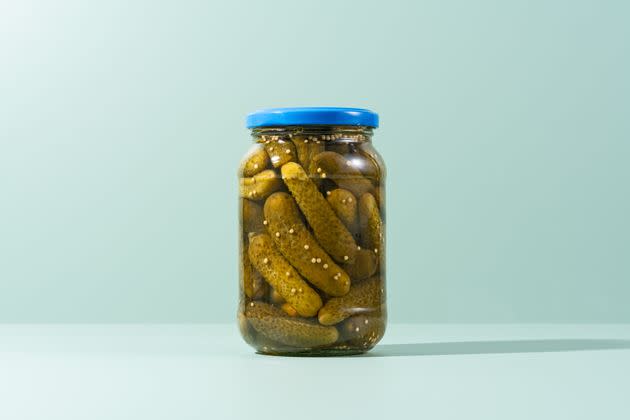Footballers Have Been Spotted Drinking Pickle Juice, But Is It Actually Effective?

If you’re keenly watching the Euros, you may have noticed that, during the opening game against Serbia, England defender Kieran Trippier was spotted downing two sachets of pickle juice, which is a new one on us.
What’s wrong with a good ol’ bottle of water, right?
But Trippier is far from the first to appreciate the tangy taste of pickle juice. Pickleback cocktails — which are a blend of pickle juice, whisky, simple syrup and lime juice — have taken off in bars across the UK.
However, all strangeness aside, is pickle juice actually good for you? We spoke with nutritionist Guna Bilande from Weight Loss Riga to learn more about it.
Is pickle juice good for you?
Well, for non-athletes, maybe not.
Bilande cautions against frequent consumption of pickle juice, especially for non-professional athletes or those who are not under medical supervision.
“Pickle juice is extremely high in sodium, which can contribute to hypertension if consumed regularly,” she explains.
“While it might provide quick relief from cramps, the long-term effects of excessive salt intake are a serious concern. High blood pressure is a leading risk factor for heart disease and stroke.”
Bilande says that one small bottle of pickle juice can contain up to 1,000mg of sodium, which is nearly half the recommended daily intake for an average adult.
“Regularly consuming such high amounts of sodium can lead to elevated blood pressure, making the heart work harder to pump blood through the body
“This increased pressure can damage blood vessels and the heart over time, potentially leading to chronic health issues.”
Frequent pickle juice consumption isn’t recommended for everyone
For professional athletes, pickle juice is a safe choice as athletes are likely to sweat out significant amounts of sodium
However, Bilande said: “The sodium needs of an average person are much lower, and excessive salt intake can quickly lead to negative health outcomes,
“The taste and acidity of pickle juice can cause gastrointestinal discomfort, making it impractical for cramp prevention.”
Instead, Bilande recommends that we opt for electrolyte drinks instead.
“Electrolyte drinks provide essential minerals such as potassium and magnesium, which help prevent cramps and support overall muscle function without the health risks associated with high sodium intake
“These alternatives are gentler on the stomach and ensure that athletes get the necessary hydration without compromising their long-term health.”
Guess I’ll lay off the pickle juice for now.

